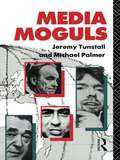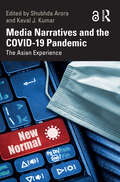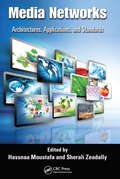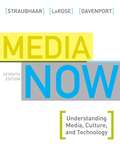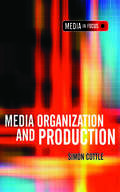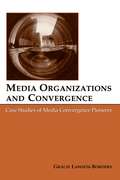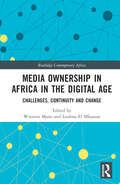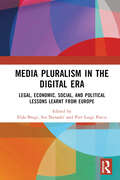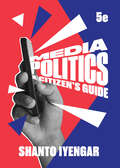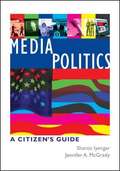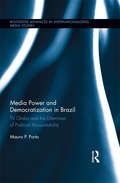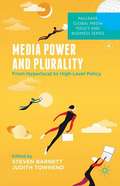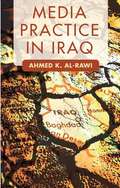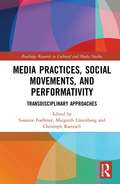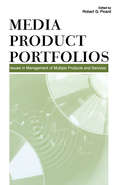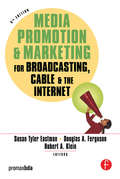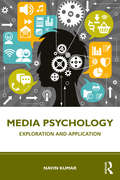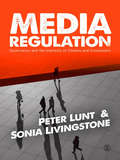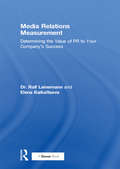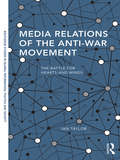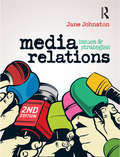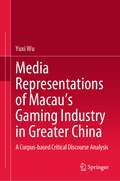- Table View
- List View
Media Moguls (Communication and Society)
by Michael Palmer Jeremy TunstallThe emergence of a few powerful individuals in control of large sections of mass communication industries has coincided with world-wide media de-regulation. In the first book to take a close look at media moguls as a species, Jeremy Tunstall and Michael Palmer show how a handful of own-and-operate entrepreneurs run their empires with a highly eccentric and highly political management style. Individuals such as Berlusconi, Hersant, and Murdoch, in France, Germany, Italy, Britain and the US, are considered in the context of the changing European media industry. The book considers other, non-mogul trends: the emergence of a European media policy and a European-US-Japanese world media industry. Additional case studies focus on Reuters as a news-and-data super-agency and the part played by advertising and other media lobbies in shaping media policy.
Media Narratives and the COVID-19 Pandemic: The Asian Experience
by Shubhda Arora Keval J. KumarThis volume investigates mediated lives and media narratives during the Covid-19 pandemic, with Asia as a focus point. It shows how the pandemic has created an unprecedented situation in this globalized world marked by many disruptions in the social, economic, political, and cultural lives of individuals and communities— creating a ‘new normal’. It explores the different media vocabularies of fear, panic, social distancing, and contagion from across Asian nations. It focuses on the role media played as most nations faced lockdowns and unique challenges during the crisis. From healthcare workers to sex workers, from racism to nationalism, from the plight of migrant workers in news reporting to state propaganda, this book brings critical questions confronting media professionals into focus. The volume is of critical interest to scholars and researchers of media and communication studies, politics, especially political communication, social and public policy, and Asian studies.
Media Narratives and the COVID-19 Pandemic: The Asian Experience
by Shubhda Arora Keval J. KumarThis volume investigates mediated lives and media narratives during the Covid-19 pandemic, with Asia as a focus point. It shows how the pandemic has created an unprecedented situation in this globalized world marked by many disruptions in the social, economic, political, and cultural lives of individuals and communities— creating a ‘new normal’. It explores the different media vocabularies of fear, panic, social distancing, and contagion from across Asian nations. It focuses on the role media played as most nations faced lockdowns and unique challenges during the crisis. From healthcare workers to sex workers, from racism to nationalism, from the plight of migrant workers in news reporting to state propaganda, this book brings critical questions confronting media professionals into focus.The volume is of critical interest to scholars and researchers of media and communication studies, politics, especially political communication, social and public policy, and Asian studies.
Media Networks: Architectures, Applications, and Standards
by Sherali Zeadally Hassnaa MoustafaA rapidly growing number of services and applications along with a dramatic shift in users' consumption models have made media networks an area of increasing importance. Do you know all that you need to know?Supplying you with a clear understanding of the technical and deployment challenges, Media Networks: Architectures, Applications, and Standard
Media Now: Understanding Media, Culture, And Technology (Mindtap Course List Series)
by Joseph Straubhaar Lucinda Davenport Robert LaRoseOffering the most current coverage available, MEDIA NOW: UNDERSTANDING MEDIA, CULTURE, AND TECHNOLOGY, 9e equips readers with a thorough understanding of how media technologies develop, operate, converge, and affect society. The text provides a comprehensive introduction to today's global media environment and ongoing developments in technology, culture, and critical theory that continue to transform the rapidly evolving industry−and impact your daily life. Focusing on the essential history, theories, concepts, and technical knowledge, MEDIA NOW develops readers' media literacy skills to prepare them for work in the expanding fields of the Internet, interactive media, and traditional media industries. In addition to vivid infographics and illustrations, the cutting-edge Ninth Edition includes the latest developments and trends in social media, e-publishing, policy changes for Internet governance, online privacy protection, online ad exchanges, the changing video game industry, and much more.
Media Now: Understanding Media, Culture, and Technology
by Joseph Straubhaar Robert Larose Lucinda DavenportMEDIA NOW, Seventh Edition, empowers you to think critically about the media and its effects on culture by providing a thorough understanding of how media technologies develop, operate, converge, and affect society. MEDIA NOW prepares you for encounters in the expanding fields of the Internet, interactive media, and traditional media industries through engaging, up-to-date material that covers the essential history, theories, concepts, and technical knowledge you need to thrive. Extensively updated in a new sixth edition, MEDIA NOW provides a comprehensive introduction to today's global media environment and ongoing developments in technology, culture, and critical theory that continue to transform this rapidly evolving industry and affect our daily lives.
Media Organization and Production (The Media in Focus series)
by Simon CottleDrawing on the work of international contributors Media Organization and Production examines a wide range of global-local media organizations and the production of different mediums and genres. Following the editor's introduction which sets out the principal differences of approach and defining debates, chapters address: transnational and national, commercial and public service corporations; international film and TV co-productions; children's television news production, the historical development of 'liveness' on radio, and music journalism; the politics and organizational forms of alternative media production including radical newspapers, video and the internet; and the changing 'production ecology' of natural history television. These topics are examined through a variety of theoretical and conceptual frameworks that help to illuminate how cultural production often involves a complex articulation of differing influences and constraints, both material and discursive, intended and unintended, structurally determined and culturally mediated.Together the chapters in this book help to recover this complexity and thereby help us to better understand the nature and output of today's media.
Media Organizations and Convergence: Case Studies of Media Convergence Pioneers (Routledge Communication Series)
by Gracie L. Lawson-BordersThis volume offers a timely examination of technology's impact on media companies and the results of convergence among media industries, considering the effects on journalistic, business, and economic practices. Media Organizations and Convergence: Case Studies of Media Convergence Pioneers considers the many definitions of convergence and explores the changes in communication technologies. Author Gracie L. Lawson-Borders provides a brief history of media segments and their evolutions as they adapt to emerging technologies, media conglomeration, and the competitive and global changes that have occurred in the industry. She also examines the theoretical implications of technology and convergence in the operations and practices of media organizations.The case studies included here profile three media convergence pioneers--Tribune Company in Chicago, Media General in Richmond, and Belo Corporation in Dallas--that have incorporated convergence into their journalistic practices. Lawson-Borders considers the social, cultural, and political implications of convergence, and presents issues and concerns for the future of convergence in the media industry.As a snapshot of media convergence at the current stage in its evolution, this book offers important insights into the business of media at a time of dramatic change. It will be a valuable resource for scholars and students in media management, mass media, and related areas of the media industry.
Media Ownership in Africa in the Digital Age: Challenges, Continuity and Change (Routledge Contemporary Africa)
by Winston Mano Loubna El MkaouarWho owns the media and communications in Africa today and with what implications? The book elegantly answers this urgent question by unpacking multiple dimensions of media ownership through rare and authoritative perspectives, including both historical and contemporary digital developments. It traces the evolving forms of ownership of media and communications in specific African contexts, showing how they interact with broader changes in and outside the continent. The book also shows how Big Techs, such as Meta (formerly known as Facebook), are involved in a scramble for Africa’s digital ecosystem and how their advance brings both opportunities and concerns about ownership and control. The chapters analyse evolving forms of ownership and their implications on media concentration and democracy across Africa. The book offers a nuanced account of how media ownership structures are in some instances captured with an ever-growing and complex ecosystem that also has new opportunities for public interest media. Offering a significant representation of the trends and diversity of existing media systems, the book goes beyond the postcolonial geographical divisions of North and Sub-Saharan Africa to highlight common patterns and significant similarities and differences of communications ownerships between and within African countries. The contributors expose media and communications ownership patterns in Africa that are centralised and yet decentralising and in some cases, battling, resurging and globalising.
Media Pluralism in the Digital Era: Legal, Economic, Social, and Political Lessons Learnt from Europe
by Elda BrogiBringing together scholars, journalists, and researchers from 27 European countries, this book provides a comparative and longitudinal analysis of the evolution of conditions and standards relevant for sustainable, free, and plural media and journalism in Europe in the last ten years.Approaching the challenging and ever-changing concept of media pluralism from various complementary and sometimes conflicting angles, combining legal, economic, social, and political perspectives, chapters provide a holistic account of the concept of media pluralism, a key condition for a well-functioning democracy. This book draws on data from the Media Pluralism Monitor project, a scientific tool designed and implemented on a regular basis to document the health of media ecosystems, to provide insights into central dimensions of media systems across the EU and candidate countries. These include: the fundamental protection of freedom of expression and safety of journalists and the independence of media authorities; market plurality, transparency of ownership, media concentration, media viability, competition enforcement, and digital platforms’ dominance; disinformation, media literacy, and digital challenges; political independence, conflicts of interest, editorial autonomy, and the independence of public service media; social inclusiveness, including access to media and representation of women and community media. Offering a comprehensive overview of key areas of EU media policy, causes and solutions for the media economic struggle, and innovative examples of business models for journalism in the digital age, this book is recommended reading for advanced students and researchers of media policy and regulation, as well as policymakers.
Media Politics (Fifth Edition)
by Shanto IyengarA current perspective from a leading scholar This significant revision shows how current issues like the normalizing of “alternative facts,” the management of the COVID-19 crisis, the 2020 election and Trump’s exit from office, and the proliferation of social media fit into a larger understanding of political communication. Shanto Iyengar, a leading scholar in the field, makes contemporary research accessible and engaging with new examples and data throughout. No book illuminates more clearly how media influences politics and how politicians use media to get elected, stay in power, and achieve policy goals. This purchase offers access to the digital ebook only.
Media Politics: A Citizen's Guide
by Shanto Iyengar Jennifer McgradyIyengar and McGrady (Stanford U.) provide a text that discusses the rise of media-based politics in the US, how the media affects American politics, and how politicians use it to their advantage. Campaigning, public relations tactics, and the effects of media on the general public are also detailed. Annotation ©2007 Book News, Inc., Portland, OR (booknews.com)
Media Power and Democratization in Brazil: TV Globo and the Dilemmas of Political Accountability (Routledge Advances in Internationalizing Media Studies)
by Mauro PortoIn this book, Porto analyzes the role of TV Globo in the democratization of Brazil. TV Globo, one of the world's largest media conglomerates, has a dominant position in Brazil's communications landscape. It also exports telenovelas to more than 130 countries and has established joint ventures with transnational media conglomerates. Beginning in the mid-1990s, TV Globo began a process of "opening," replacing its authoritarian model of journalism with a more independent reporting style. Representations of Brazil in prime time telenovelas have also shifted. Given this shift, Porto considers some of the following questions: •What explains these changes in Brazil's most powerful media company? •How are they related to processes of political and social democratization? •How did TV Globo's opening affect Brazil's emerging democracy, especially in terms of the quality of political accountability mechanisms? Porto uses the Brazilian case of TV Globo to analyze the larger links between democratization, civil society mobilization, and media change in transitional societies.
Media Power and Plurality
by Steven BarnettDemocratic governments throughout the world aspire to plurality and diversity of voice as a policy goal, which is fundamental to a healthy democracy. Over the last 20 years, however, economics, technology, political ideology and global corporate power have often conspired to frustrate those normative aims. More recently, different plurality problems have been prompted by access issues and the burgeoning reach and power of digital intermediaries such as Google, Facebook and Amazon. While some countries, such as the UK and US, have seen little creative activity from policy makers, other countries have sought to explore new approaches to funding and to exploit new technologies at both national and local level. This edited collection, featuring international scholars from a range of disciplines, examines contemporary and emerging policy issues around media plurality from grassroots local initiatives to high-level policy debates in both mature and emerging democracies, in each case drawing out generalizable initiatives and ideas for policy thinking in an increasingly complex area.
Media Practice in Iraq
by Ahmed K. Al-RawiA historical survey of the Iraqi media from its beginning up to the present day, focusing on the post-2003 media scene and the political and societal divisions that occurred in Iraq after US-led occupation. Investigates the nature of the media outlets and offers an analysis of the way Iraqi satellite channels covered the 2010 general elections.
Media Practices, Social Movements, and Performativity: Transdisciplinary Approaches (Routledge Research in Cultural and Media Studies)
by Margreth Lünenborg Susanne Foellmer Christoph RaetzschAs individuals incorporate new forms of media into their daily routines, these media transform individuals’ engagement with networks of heterogeneous actors. Using the concept of media practices, this volume looks at processes of social and political transformation in diverse regions of the world to argue that media change and social change converge on a redefinition of the relations of individuals to larger collective bodies. To this end, contributors examine new collective actors emerging in the public arena through digital media or established actors adjusting to a diversified communication environment. The book offers an important contribution to a vibrant, transdisciplinary, and international field of research emerging at the intersections of communication, performance and social movement studies.
Media Product Portfolios: Issues in Management of Multiple Products and Services
by Robert G. PicardMedia product portfolios are rapidly becoming the predominant shared characteristic of media companies worldwide. The phenomenon involves firms from all kinds of media--newspapers, magazines, television, radio, cinema--and is found in enterprises ranging from small, local firms to large, globalized companies. This volume is the result of a coordinated effort of scholars in the United States and Europe to explore the characteristics, processes, challenges, and implications of media product portfolios.This book breaks new ground by introducing the concepts of product portfolio management and applying them to media companies in a comprehensive manner. It draws from knowledge and methods of analyzing product portfolio management in other industries, applies that knowledge to media industries, and analyzes current practices in media firms. The process and issues of portfolio strategy, development, and management are complex and wide ranging. The book explores the development of media product portfolios from an interdisciplinary perspective, providing insight from business, economic, organizational, and communication approaches. The book explores why and how firms develop portfolios, how company strategy and organizational development relate to portfolios, the role of leaders in developing portfolio activities, economic and economic geography issues in portfolios, production issues, challenges in managing multiple products and operations, issues of marketing and branding issues in portfolios, personnel implications, and the unique challenges in the internationalization of media portfolio operations.
Media Promotion & Marketing for Broadcasting, Cable & the Internet
by Robert Klein Douglas A. Ferguson Susan Tyler EastmanThis fifth edition of the successful Promotion and Marketing for Broadcasting, Cable, and the Web, 4ed takes an important, timely look at the newest media venue, the Internet. Under its new title, Media Promotion and Marketing for Broadcast, Cable and the Internet, 5ed it takes a fresh look at the industry and the latest strategies for media promotion and marketing.The book explores the scope and goals of media production from the perspectives of network and local television, cable, Internet and radio, including public broadcasting. Topics include: goals of promotion; research in promotion; on-air, print, and Web message design; radio promotion; television network and station promotion and new campaigns; non-commercial radio and television promotion; cable marketing and promotion; research and budgeting for promotion; syndicated program marketing; global and international promotion and marketing; and online marketing and promotion.
Media Psychology
by David GilesMedia Psychology examines the impact that 21st century media use has on human behavior, from teenage crushes on pop stars to soap fandom in adulthood. It brings together North American communication research with European media research in a variety of disciplines--psychology, sociology, communication and media studies--and in doing so, maps out the territory for media psychology. David Giles argues that psychologists have been guilty of ignoring the influence of the media over the last century, seeing it at best as a minor nuisance that will eventually go away. However, with the increasing prevalence of new electronic forms of mass communication, the media seem to have a greater influence than ever over our daily lives. In this book, Dr. Giles tackles the traditional topics of media psychology--sex, violence, advertising--along with sections on developmental aspects of media influence and the psychology of the audience. He also examines a number of specific media genres--news, sports, soaps, and the increasingly popular audience participation media, such as "reality" and "lifestyle" television. In addition, he asks what light psychology can shed on the popularity of these genres and the response of their audiences. Finally, there are chapters on the increasing influence of the Internet and on the representation of psychology and psychologists themselves in the media.
Media Psychology: Exploration and Application
by Navin KumarThis book examines media psychology as a field of study and provides a fundamental understanding of its emergence and application. It covers various key themes such as consumer behavior, mass media and advertising, media and culture, media messages and their effects on individual and group behavior in the Indian context. It highlights the role of media psychology with reference to citizenship and pedagogy and studies the emerging concept of digital altruism. The author also discusses various research methods used in this field that help to objectively evaluate the impact of mass media messages on people and people’s effect on the functioning of mass media. This comprehensive book will be useful to students and researchers of psychology, media psychology, mass-communication, consumer behavior, digital marketing, corporate communication, and media studies.
Media Regulation: Governance and the Interests of Citizens and Consumers
by Sonia Livingstone Peter LuntIn Media Regulation, two leading scholars of the media examine the challenges of regulation in the global mediated sphere. This book explores the way that regulation affects the relations between government, the media and communications market, civil society, citizens and consumers. Drawing on theories of governance and the public sphere, the book critically analyzes issues at the heart of today's media, from the saturation of advertising to burdens on individuals to control their own media literacy. Lunt and Livingstone incisively lay bare shifts in governance and the new role of the public sphere which implicate self-regulation, the public interest, the role of civil society and the changing risks and opportunities for citizens and consumers. It is essential reading to understand the forces that are reshaping the media landscape.
Media Relations Measurement: Determining the Value of PR to Your Company's Success
by Ralf Leinemann Elena BaikaltsevaNowadays most managers seek a complete picture when it comes to return on investment and this applies to PR too. Despite this, and the developments in measurement tools for marketing and advertising, PR has lagged behind and different professionals have favoured different models. Ralf Leinemann and Elena Baikaltseva's book brings together the range of models for evaluating PR effectiveness and develops them into a series of appropriate tools for business use. Basic concepts such as balanced scorecards, business fundamentals and planning processes are all covered. The authors also introduce their own theory of PR evaluation and apply it to five different types of activity: interviews, press conferences, generic campaigns, crisis PR and long-term projects. In addition, the book contains many valuable tips and real-life examples throughout. Written for corporate PR practitioners and marketing/communications specialists, this book brings together business objectives and the evaluation of company impact in terms of media, reputation, visibility of the company and its competitors. In total, more than 60 different methods of evaluation are discussed, providing readers with an indispensable toolkit for mapping each PR task or project by selecting the appropriate method from the menu provided.
Media Relations of the Anti-War Movement: The Battle for Hearts and Minds (Routledge Studies in Global Information, Politics and Society)
by Ian TaylorIn this book, Ian Taylor examines how a social movement, the anti-Iraq War movement in the UK, engaged with the media as a part of their campaigning against the invasion and occupation of Iraq. Moving beyond content analysis to draw upon interviews with locally based journalists and activists, Taylor examines how locally based anti-war groups engaged with their local press, as well as how those groups were reported on by the local press in their respective areas. In the process of exploring these ideas, the book takes on questions like: How did local journalists assess the legitimacy of the anti-war movement? How, why, and to what extent did opponents of the war pursue local press coverage? What bearing did the social composition of the movement have on the way they set about engaging with the media? How did the local press handle the controversy surrounding opposition to military action against Iraq? Media Relations of the Anti-War Movement makes a unique contribution to research on the interactions between social movements and the media and plugs a major gap in the literature on the Iraq War and the media.
Media Relations: Issues and strategies
by Jane JohnstonPublic relations and the media are in a time of major change. The rise of social media, altered media platforms, evolving legislative environments and new models of communication have altered not only the working environments of public relations and the news and entertainment media, but also many aspects of how these industries work together.Media Relations provides a practical and thorough introduction to media work in this changing environment. Based on a solid understanding of media culture and theory, Jane Johnston shows how to steer a path between the technical and human elements of media relations. She drills down into the different types of media, analysing their applications, strengths and weaknesses, and shows how to target your message to the right media outlets, whether national television, community radio, celebrity magazines or influential blogs.This second edition has been revised throughout and includes new case studies, and new chapters on digital and social media, media campaigns, and legal and ethical considerations.'Media Relations: Issues and Strategies is written in an engaging, easy to understand style. It provides excellent examples and cases of media relations.' - Global Media Journal
Media Representations of Macau’s Gaming Industry in Greater China: A Corpus-based Critical Discourse Analysis
by Yuxi WuThis book is the first linguistic study that combines CL and CDA to compare the media representations of Macau’s gaming industry in English-language newspapers published in Mainland China, Hong Kong, and Macau. An analytical framework based on the notion of the extended units of meaning of a lexical item (Sinclair, 2004) is adopted to examine the ideological stances regarding Macau’s gaming industry among three English-language newspapers published in the three Chinese territories mentioned above by comparing the patterns of co-selection of shared and unique words and phraseologies. The book’s findings confirm that the news media in these three territories differ in their ideological stances. Moreover, the book offers readers a fresh perspective on Macau by exploring how the region and its gaming industry are represented in three news article corpora. Thus, it provides unique insights into the similarities and differences among these three territories. Further, the research suggests that the methods adopted in this book can be replicated to examine and compare the news and political discourses in a variety of contexts. Accordingly, the book represents a valuable resource not only for students majoring in linguistics, media studies, communication, journalism, etc., but also for researchers in the fields of corpus linguistics, critical discourse analysis, etc.
